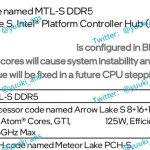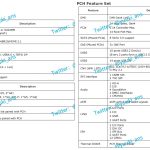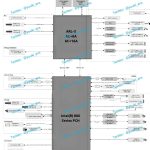Some of Intel's confidential slides have been leaked on social media, giving us the first glimpse of what the upcoming Arrow Lake-S and 800-series chipsets will offer.
The information provided in the documents shared by YuuKi_AnS (via VideoCardz) mentions the MTL-S (Meteor Lake-S), which has been officially discontinued. However, the upcoming ARL-S (Arrow Lake-S) is expected to use the same MTL-S baseboard. While some details in the leaked slides may be outdated, the essential aspects remain relevant.



Image credit: YuuKi_AnS
The slides only mention an 8+16+1 configuration, suggesting that Meteor Lake-S would have a maximum of 24x cores (8x P-cores and 16x E-cores). Moreover, the same slide confirms a 125 W TDP for the alleged K-series CPUs.
According to the slides, the first motherboards with the LGA-1851 socket will support DDR5-6400 memory, with no mention of DDR4 being supported. Intel's first significant change to a new platform since Alder Lake will also feature PCIe 5.0 support, with the CPU adding four more lanes for storage. The CPU will have 16 dedicated PCIe 5.0 lanes for graphics, four PCIe 5.0 lanes for storage, and four PCIe 4.0 lanes for additional storage. As for the 800-series chipset, it'll feature a total of 24 PCIe 4.0 lanes, with at least eight lanes for two M.2 drives. The diagram also confirms the presence of 4+4+2 Gen4 channels for other PCIe-connected devices, such as graphics or expansion cards. Additionally, we have confirmation of Bluetooth 6, DisplayPort 2.0 UHBR20, HDMI 2.1, USB 4, and Thunderbolt 4 support.
Intel has not made any official statements on the longevity of the LGA-1851 platform. However, the new platform is expected to remain relevant until 2026, potentially including the Panther Lake-S series.
KitGuru says: Do you think the upcoming Arrow Lake-S platform will be on par with what AMD is preparing? Are you expecting a win for the blue or the red team with the next generation of mainstream desktop CPUs?
The post Leaked slides share more details on Intel Arrow Lake-S and 800-series chipsets first appeared on KitGuru.
0 comments :
Post a Comment